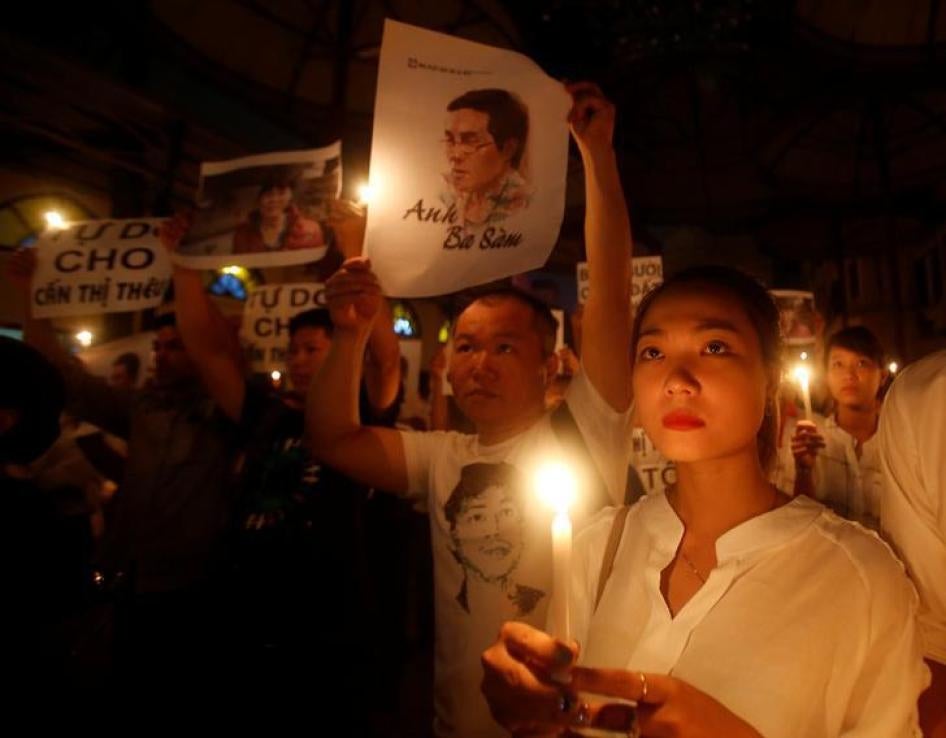Vietnam’s prime minister Nguyen Xuan Phuc is visiting Washington on May 31 and meeting with President Trump, the latest of a growing list of autocrats Trump has hosted, visited, or praised on the telephone.
After Trump’s glowing endorsement of Philippines’ Rodrigo Duterte, his praise of Egypt’s strongman Abdel Fattah el-Sisi, his warm words for Turkey’s President Recep Tayyip Erdogan, and cozy visit with the Saudi royal family, one might be tempted to think that the idea of the US promoting human rights in Vietnam is absurd. For decades, even as the United States has steadily strengthened its ties, it has pressured Hanoi on political prisoners, religious liberty, and labor rights. But how can those efforts possibly continue in a Trump administration? Even if the administration cared about human rights, it now lacks credibility.
For its part, Hanoi is interested in arms deals, and possibly a new bilateral trade agreement, with the Trans-Pacific Partnership (TPP) on ice. Most of Vietnam’s export market is tied to its neighbor China, and the government has been looking to hedge its position by improving ties with the US. (They are also negotiating a trade agreement with the EU and others.)
But if Prime Minister Phuc thinks he will have a free ride in Washington, he may be in for a rude surprise. President Trump constitutionally leads on foreign policy, but Congress as always advises and consents, and can throw up roadblocks to closer US-Vietnam ties if members don’t like what they see. Congress must endorse trade agreements, and it can block arms deals.
There is broad bipartisan concern in Congress about Vietnam’s troubling human rights record: it is an issue that unites members from both parties, and has brought together liberals and conservatives—from Senators Patrick Leahy to John Cornyn—to work together on legislation and resolutions. The Vietnamese-American community is active politically in the United States and has repeatedly and effectively pressed members to focus on Vietnam’s human rights record.
This is the reality the Trump administration officials have to face: they may not want to promote human rights, but political realities demand that they must. US officials can present the realities like a middleman would in a negotiation: “Look, Congress needs to be won over if the US-Vietnam relationship is going to make any significant progress. Leaders in Congress have made it clear that your government needs to release prisoners, stop attacks on dissidents, and undertake legal reforms, or they will place limits on any agreements we might reach.”
There are plenty of cases for Vietnam to address. There is the detention of dissident blogger Tran Huynh Duy Thuc, who is serving a 16-year prison sentence for his internet writings and attempts to form a group to promote democracy. The cases of religious activists Ngo Hao and Nguyen Cong Chinh, who are serving 15- and 11-year prison sentences respectively for their advocacy on religious freedom. There is lawyer Nguyen Van Dai, bloggers Nguyen Huu Vinh, Nguyen Dinh Ngoc, Nguyen Ngoc Nhu Quynh (“Mother Mushroom”) and Ho Van Hai, and the longtime human rights advocates Tran Anh Kim and Le Thanh Tung.
When US leaders raise names publicly, it can often lead to those prisoners being treated better in prison—and released sooner. That is reason enough to mention them by name.
US officials should also raise concerns with the troubling rise in cases of harassment and violence against dissidents by so-called government thugs—widely assumed to be plainclothes government agents. Human Rights Watch has documented numerous cases in the last year of unidentified men in civilian clothing beating dissidents, vandalizing their property, and threatening them with impunity, sometimes in plain view of the official police.
The Vietnamese government needs to hear that its record is a problem. After all, the Politburo, while generally retrogressive and recalcitrant, remains sensitive to criticism. The violence of plainclothes thugs is demonstrative: it suggests that the government may be trying to evade international criticism, as the use of thugs provides a measure of deniability, however implausible.
And outside pressure can lead to concrete results. Take the now-defunct TPP. While highly problematic, the agreement contained provisions that would have compelled Vietnam to improve its labor record. Those provisions were there in large part because Congress pressed for them.
President Trump’s apparent apathy about human rights aside, Congressional concerns about Vietnam’s record remain, and if there are to be trade agreements or arms deals, the government will need to undertake reforms and ease its persecution of dissidents.
If nothing else, one positive outcome for this visit would be for Prime Minister Phuc to return to Hanoi and tell the Politburo that human rights issues are still a major topic in Washington. It is up to Congress to make sure that message is sent.










